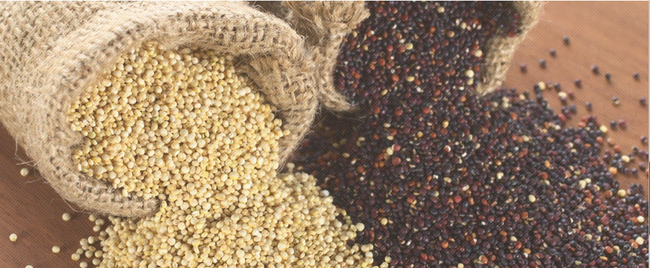It's a hard fact to swallow, but those of us with reduced HDL (good cholesterol) levels combined with increased LDL (bad cholesterol) and triglyceride levels, are at an increased risk of heart attack and stroke.
It's critical to understand the role nutrition can play in controlling, preventing and treating cardiovascular disease (CVD); the leading cause of death for persons living with spinal cord injuries.

HEALTH TIPS
4 Easy Steps to helping prevent CVD
1. fibre
Increase your fibre intake. Fibre, found in fruits, vegetables, whole grains and legumes binds to cholesterol/fat in the intestines and helps eliminate it in our waste.
2. antioxidants
Increase your intake of antioxidants, such as selenium, vitamins E, C & A, founds in foods like asparagus, dark berries, citrus fruits, yellow & orange vegetables (eg. sweet potato) and sunflower seeds respectively, protect arteries from free radical damage. Free radicals are unstable, reactive molecules that attack and damage tissue, particularly arteries. This in turn can lead to plaque build-up and contribute to the development of cardiovascular disease. Antioxidants act to neutralize these damaging free radicals.
3. trans fats
Eliminate trans fat from your diet. Trans fats (aka hydrogenated oil & partially hydrogenated oil) are unnatural, man-mad fats created to increase the shelf-life of food. These fake fats can cause major clogging of your arteries. Trans fat is known to increase blood levels of LDL, while lowering levels of HDL. Trans fat can also interfere with your body's use of the beneficial omega-3 fats. Avoid all fast and junk food as these tend to be loaded with this unhealthy fat.
4. refined sugar
Reduce or eliminate your consumption of refined sugar. High blood sugar levels can not only contribute to increased LDL and triglyceride levels, but also cause collagen damage in your arteries.
RECIPE:
Protein-rich Super Seed Quinoa!
 This delicious Curry Quinoa recipe combines all of the above recommendations and more! Try something new and eat your way to a healthy heart!
This delicious Curry Quinoa recipe combines all of the above recommendations and more! Try something new and eat your way to a healthy heart!
Delicious CURRY QUINOA
For those of you not familiar, quinoa is a protein-rich seed, that's incredibly easy to cook and acts as a great substitute for rice and pasta. This super seed contains a good dose of fibre and other important heart healthy nutrients such as copper and manganese, which serve as co-factors to a very powerful antioxidant. Quinoa is also a great source of magnesium, a mineral that helps to dilate arteries, inhibit platelet aggregation and blood clot formation, as well as reduce the size of any arterial blockages. Moreover, the rich-yellow spice tumeric used in this recipe is a potent antioxidant and has powerful cholesterol-lowering, triglyceride-lowering and anti-inflammatory properties.
INGREDIENTS:
- 1 cup quinoa
- 1 ½ tablespoons coconut oil
- ½ cup diced onions
- 1 teaspoon grated fresh ginger root
- ½ fresh green chile, minced, or 1/8 teaspoon cayenne
- ½ teaspoon turmeric
- ½ teaspoon ground coriander
- ¼ teaspoon ground cinnamon
- ½ teaspoon salt
- 1 ¾ cups water
- ½ cup fresh or frozen green peas
- 1-2 tablespoons chopped fresh cilantro (optional)
DIRECTIONS
- Place quinoa in fine-mesh strainer and rinse with cold water. Drain well.
- In a heavy saucepan, warm the oil and sauté the onions on medium high heat for 4-5 minutes. Add the ginger, chile, or cayenne, and the quinoa. Cook for a minute, stirring constantly. Stir in the turmeric, coriander, cinnamon, and salt and cook for another minute, stirring.
- Add the water and bring to a boil. Cover, reduce the heat, and simmer for 15 minutes.
- Stir in the peas, cover, and cook for 4 or 5 minutes, until the peas are tender and the water has been absorbed.
- Before serving, fluff with a fork and add the cilantro, if you wish.
*Recipe provided by Moosewood Restaurant New Classics Cookbook
NUTRITION THEMES
Gluckstein Nutrition Blog for Rehabilitation is a blog series with healthful, nutritional tips and recipes to help you and your clients achieve optimal health and well-being.
- Breakfast Smoothies
- Nutrition for Bone Health
- Importance of Hydration
- Eat-Well-Live-Well
ABOUT THE AUTHORS
Joanne Smith, B.A., BRT Dip, C.N.P and Kylie James, B.Sc. (O.T.), C.N.P
Co-authors of the book Eat Well Live Well with SCI and Other Neurological Conditions. For more information on nutrition for neurological injuries go to https://www.eatwelllivewellwithsci.com/
Share
Subscribe to our Newsletter

